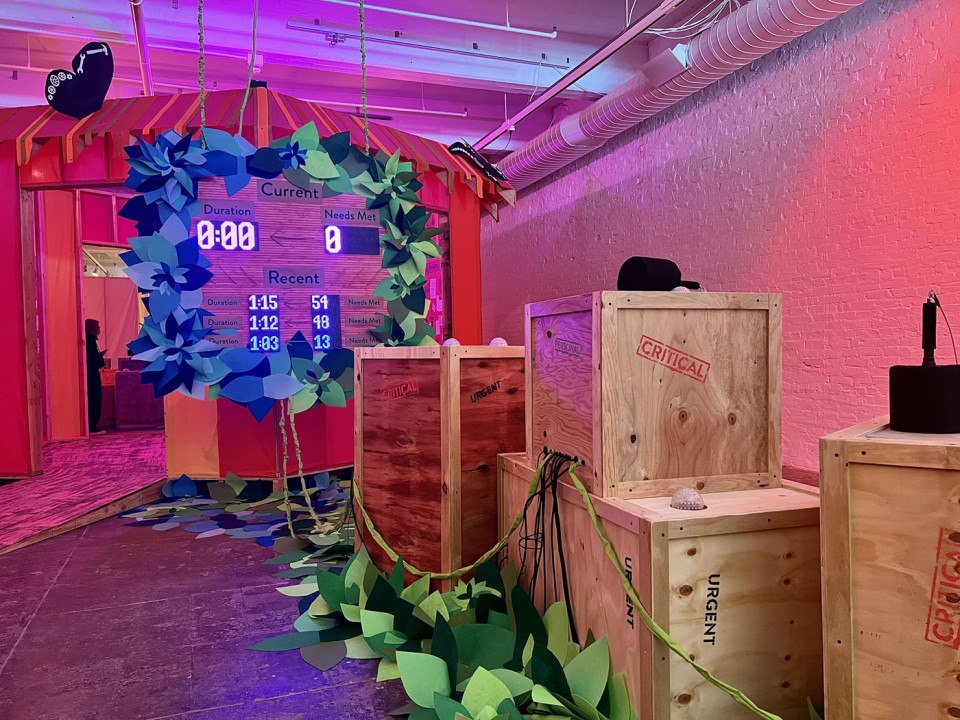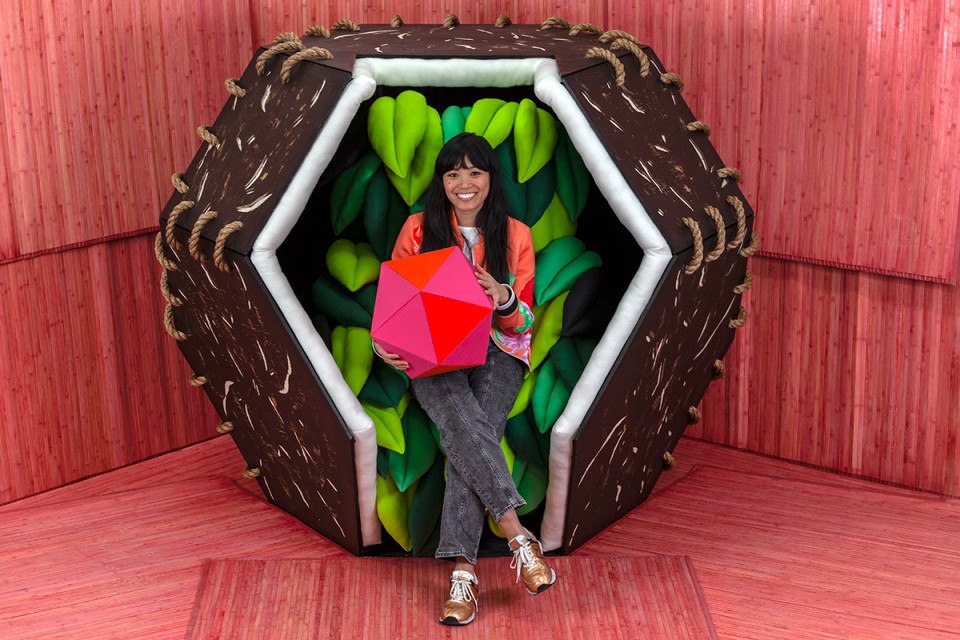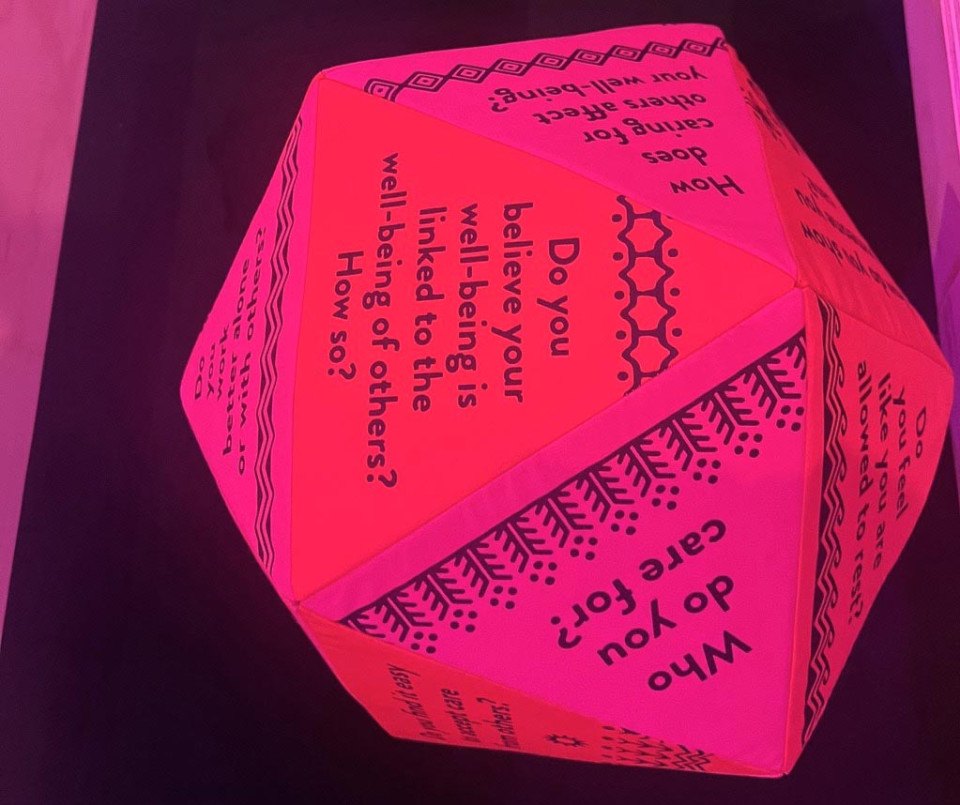This New Art Exhibit Is Low-Key the Best Free Self-Care in Philly Right Now
In 2024, the gamification of care speaks volumes. And the Coconut Pods don’t hurt, either.

Whac-a-Mole game at Group Hug at the Fabric Workshop and Museum / Photograph by Laura Swartz
“As you get comfy, this space will shift gently to accept you.” Ocean sounds drown out arcade-like beeps as my “Coconut Pod” tells me I am “being cared for.” I am reclined into darkness. It is brief, but it is bliss.
No, I’m not at a new spa’s high-concept relaxation room; I’m at an art exhibit. At a donation-based museum.
I forgot to mention something: The pods only recline when others are playing Whac-a-Mole together.
“How do you build a sculpture masquerading as an arcade game to talk about care?” This is how New York-based artist Risa Puno describes her immersive exhibit, Group Hug, which just opened at the Fabric Workshop and Museum. It’s the product of her two-year residency and collaboration with the FWM Studio, and runs through July 21st. The exhibit fuses hands-on gameplay, collaboration and Puno’s cultural identity to explore the intricate web of social relationships inherent in the acts of giving and receiving care.
Upon entering the exhibit, you have a choice between two paths: Would you rather “Care For” others, or be “Cared For” by others? This initial decision sparks an immersive journey, prompting participants to consider their habitual roles or desires related to care.
The exhibit then unfolds into two distinct experiences based on the chosen path. If you picked “Care For,” you first encounter the individual elements of a Whac-a-Mole game — identifying the mallet as the “Tool For Caring” and a lit-up ball as a “Need to Be Met” — and a chance to take a few practice whacks. “Each game has its own language,” Puno explains. Next, you bring your skills to the main room, where a massive scoreboard and multi-player Whac-a-Mole game awaits. The speed intensifies, with each “hit” symbolizing a need you’ve met as a caregiver.
It’s stressful and quick — and you can’t whack ‘em all.
But playing the game activates the Coconut Pods for those who selected the “Cared For” path. The geometric pods resembling giant coconut shells, filled with green felted leaves are comfy to sit in (and cute to pose in, tbh). But they reach their full potential when they’re in reclining, ocean-sounds mode.
That’s right: While some must work together in stressful, frantic multitasking, it enables others to relax and feel cared for. It feels like parenting.
Of course, you can repeat your journey and pick the other path, allowing yourself to rest and be vulnerable after the anxiety of meeting other’s needs. “It could be an infinite loop. We could just keep caring for each other,” Puno says.

Artist Risa Puno in a Coconut Pod from Group Hug / Photograph by Carlos Avendaño, courtesy of the Fabric Workshop and Museum
This is not Puno’s first use of interactive play as a means of artistic expression. Her previous pieces included Infinite Play — a Möbius strip jungle gym representing emotional obstacles — and Please Enable Cookies, where revealing personal information earned you “points” you could cash in for actual cookies. (That one was a commentary on social media.)
“Games are challenges that we willingly take on,” she explains, making them the perfect gateway for exploring deeper issues and self-reflection right now. (Our own Victor Fiorillo plays Tetris as a mindfulness practice, and there’s actual science to back it up.)
In fact, Puno’s inspiration for the name Group Hug was a New York Times crossword clue, defining the term as a “many-person act of support or affection.”

A 20-sided die with question prompts / Photograph by Laura Swartz
She explained that her own recent experiences of caring for a family member inspired her focus. Central to Puno’s vision is the pre-colonial Philippine concept of kapwa, a shared identity and moral duty to care for others as we do ourselves. In the center of the space, Puno has reconstructed a colorful bahay kubo — a traditional Philippine, hexagon-shaped dwelling. There, a giant 20-sided die prompts more discussion questions about individual and collective wellness.
But it’s fun and vibrant and whimsical. It’s “halo halo,” Puno says, referring to the colorful dessert. It is a game, after all.
Group Hug runs through July 21st at the Fabric Workshop and Museum, located at 1214 Arch Street. The museum is open Wednesdays through Sundays, and there is a suggested donation of $5 per person. All ages are welcome.


